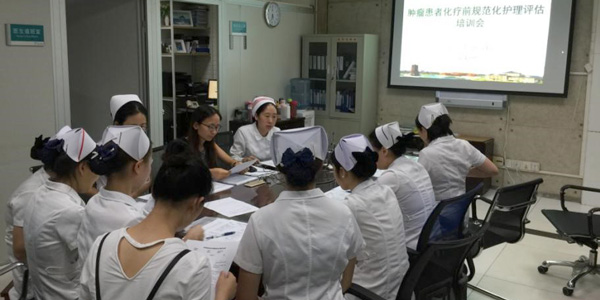Normalising pre-treatment assessment for patients with breast cancer undergoing chemotherapy

Chemotherapy has been routinely employed to treat cancer and reduce the risk of its recurrence. Despite the benefits of this treatment, exposure to anticancer chemotherapy drugs can result in numerous adverse effects, such as hypotension, renal toxicity, distress and fatigue.
Pre-treatment assessment of cancer chemotherapy is paramount in order for patients to receive effective and safe treatment. Numerous evidence-based guidelines for chemotherapy administration safety state that nurses should conduct and document comprehensive health assessments prior to administration of cancer chemotherapy.1-3
Yanni Wu, an advanced research nurse at Nanfang Hospital and an academic editor for the Journal of Nursing (China), comments: ‘The assessment of breast cancer patients prior to chemotherapy in Nanfang Hospital was mainly being documented by doctors and it was not standard for clinical nurses to do a comprehensive check of patients prior to chemotherapy. There was an urgent need to normalise pre-treatment assessment for patients in the hospital to improve standard care.’

Nanfang Hospital is a tertiary teaching hospital in Guangdong Province, PR China, with nearly 3000 beds. The breast surgery department is run by 15 nursing staff and eight doctors, and receives approximately 3600 breast cancer patients per year, of whom approximately 3000 receive chemotherapy.
Yanni Wu established a six-month evidence-based project as part of JBI’s Evidence-based Clinical Fellowship Program to improve compliance with evidence-based best practice criteria in Nanfang Hospital.
‘The aim of this project was to conduct an audit of pre-treatment assessment for patients with breast cancer undergoing chemotherapy and assess the impact of strategies to improve the compliance with evidence-based, best practice criteria in a large tertiary hospital’, says Yanni Wu.
In July 2018, Yanni Wu conducted a baseline clinical audit, adopting audit criteria developed by JBI. The baseline results indicated significant deficits in pre-treatment assessment nursing practice in the unit, with nine of the 12 audit criteria recording 0% compliance, including physical and psychosocial assessments, pre-medication requirements and whether the patient had previous exposure to chemotherapy agents.

Using the JBI Getting Research into Practice (GRiP) approach and the JBI Practical Application of Clinical Evidence System (PACES) audit and feedback tool, numerous initiatives were implemented in the breast surgery department. Some of these initiatives included establishing a project team with key stakeholders; conducting a brainstorming session to discuss possible strategies and resources that could be used to overcome challenges, such as clinical nurses’ lack of knowledge about the need for pre-treatment assessment and the limited capacity for nursing staff to do the standardised assessment; developing an educational package and training clinical nurses on how to assess patients prior to chemotherapy; and developing a checklist that included the audit criteria for nurses to make the assessment more convenient.
‘Stakeholder engagement, particularly with leaders, has been key to the success of the implementation project’, Yanni Wu says. ‘Engaging an esteemed doctor and the head nurse of the breast surgery department to conduct the comprehensive education program has significantly improved the beliefs of nurses on the importance of assessment before chemotherapy.’
Yanni Wu’s project resulted in significant increases in compliance with best practice criteria at the follow-up audit compared with the baseline audit, with all 12 criteria achieving a minimum of 90% compliance, including nine out 12 criteria increasing from 0% to 90% compliance.
‘One of the main successes of the project was including psychosocial assessment for each patient before chemotherapy. Psychological distress is common in patients with breast cancer, especially for those who experience serious adverse effects from chemotherapy. This was previously ignored in the unit and clinical nurses did not conduct it as normal practice. With the introduction of a short screening tool, nurses were able to identify patients who needed to be followed up.’
This project has demonstrated that ongoing education of clinical nurses can improve the knowledge of best practice regarding pre-treatment assessment for patients with breast cancer undergoing chemotherapy, and ongoing audits of pre-treatment assessment can make a contribution to optimise safe and effective chemotherapy treatment. Despite the successes of the initial implementation project, regular audits and ongoing training sessions with nurses continue to be carried out in order to maintain the practice change and ensure the project is supported and sustained in the hospital.
Since 2018, pre-treatment assessment has been used as a standard nursing practice in the breast surgery department at Nanfang Hospital. A follow-up audit using JBI PACES has been conducted every six months, and results (reported at June 2020) have showed all 12 audit criteria have achieved 100% compliance. This is largely due to the hospital nursing department establishing pre-assessment as a hospital policy and incorporating the assessments into annual department evaluation indicators.
An interview with the head nurse of the breast surgery department was conducted in June 2020: ‘In the past two years, several benefits have been obtained from the project. In addition to the improvement of nurses’ knowledge and the standardisation of chemotherapeutic nursing practices, a significant change has been the increased communication between nurses and patients through standardised evaluation. There are nearly 250 patients receiving chemotherapy every month. Over the past two years, nearly 10% of patients have been identified as having psychological problems through the psychosocial assessment and have received psychotherapy in a timely manner. In the past, we relied on patients or their family members to voluntarily report and seek psychological help during chemotherapy treatment.’
To disseminate the findings, lessons learned and successes of these audits to other departments in the hospital administering chemotherapy, the breast surgery nursing department is planning to host a conference on evidence-based practice achievements in October 2020. At the conference, audits from 14 implementation projects conducted over the past two years will be introduced to the leaders and head nurses from across the hospital. ‘All the audits will be printed together as a book. The conference will be free and open to all the clinical nurses and hospitals in Guangdong Province as we are trying to disseminate evidence to more clinics’, says Yanni Wu.
Furthermore, following the success of the project in Nanfang Hospital, in August 2020 Yanni Wu received funding from the Guangdong Health Commission to undertake evidence-based audit and feedback projects in hospitals across the province to normalise the pre-treatment assessment for patients with breast cancer undergoing chemotherapy. Over the next three years, Yanni Wu and her team will conduct audit and feedback projects in at least 20 primary hospitals and train at least 1000 primary nurses in Guangdong Province. ‘Receiving support from the government to implement this project across the province will ensure that we sustain, build upon and disseminate the success of this implementation project to ensure the best health outcomes for patients with breast cancer in Guangdong province.’
Further resources:
Pre-treatment assessment for patients with breast cancer undergoing chemotherapy: a best practice implementation project
JBI Manual for Evidence Implementation (for GRiP approach)
Authors

Yanni Wu and Chunlan Zhou
References
1. Canadian Association of Nurses in Oncology. Standards and competencies for cancer chemotherapy nursing practice [internet]. 2017 [cited 2018 May 15]. Available from: https://cdn.ymaws.com/www.cano-acio.ca/resource/resmgr/Resources/EN_CANO_Chemotherapy_Standar.pdf.
2. Neuss MN, Gilmore TR, Belderson KM, Billett AL, Conti-Kalchik T, Harvey BE, et al. 2016 updated American Society of Clinical Oncology/Oncology Nursing Society chemotherapy administration safety standards, including standards for pediatric oncology. J Oncol Pract. 2016;12(12):1262-71.
3. Carrington C, Stone L, Koczwara B, Searle C, Siderov J, Stevenson B, et al. The Clinical Oncological Society of Australia (COSA) guidelines for the safe prescribing, dispensing and administration of cancer chemotherapy. Asia Pac J Clin Oncol. 2010;6(3):220-37. (Level 5)
Disclaimers
The views expressed in this this World EBHC Day Impact Story, as well as any errors or omissions, are the sole responsibility of the author and do not represent the views of the World EBHC Day Steering Committee, Official Partners or Sponsors; nor does it imply endorsement by the aforementioned parties.